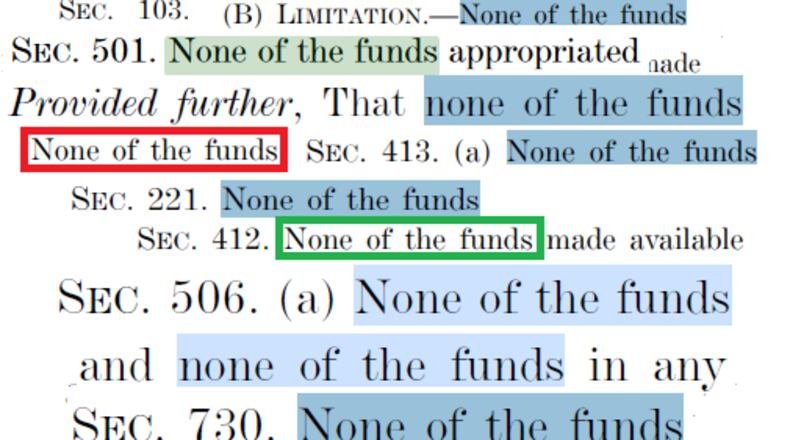Inside the bill were hundreds of provisions which spell out what can not be done with money appropriated by the Congress - known as, "None of the funds."
Here are some of the examples from the two bills. They are not presented in any specific order or importance. Just because they are listed here does not mean they are good or bad.
Here is the link to the 1,773 page bill which includes all eight of the non-defense funding measures.
Here is the link to the 540 page bill dealing with defense and security funding.
+ Keep your hands off the $1 bill. This provision has been a part of the Congressional funding bills for a number of years. Why? The vending industry is supposedly the quiet actor here, because they don't want to have to worry about re-configuring vending machines in order to accept a redesigned $1 bill.
+ Don't build any new money museums. Just after the $1 bill provision is one spending restriction that catches your eye, saying no money 'may be used by the United States Mint to construct or operate any museum' without the approval of various committees in the Congress. It would seem that no museum could be built by a federal agency without the approval of Congress, but what do I know.
+ No new airport fees. Congress has found out the hard way through the years that if lawmakers don't specifically tell an agency what *not* to do, then it might happen. In this case, one provision says 'none of the funds' can be used by the FAA to create 'new aviation user fees not specifically promulgated by law.' That would seem logical - that something can't be done unless Congress approves - but this is government.
+ No cuts to human weather observers. Back in 2015 and 2016, the FAA proposed a plan to get rid of contract weather observers (CWO's) at over one hundred airports. Reaction against it was fierce, as Congress fought to hold on to the jobs for human observers - even though many airports have automated weather equipment as well. This provision makes sure the feds don't try again.
+ Say that again? Sometimes the spending restriction is not obvious. You can Google what this means at home: "SEC. 224. None of the funds made available by this Act may be used to terminate the status of a unit of general local government as a metropolitan city (as defined in section 102 of the Housing and Community Development Act of 1974 (42 U.S.C. 5302)) with respect to grants under section 106 of such Act (42 U.S.C. 5306)."
+ That job has not existed for years. I found this one as far back as 2006. Why the Congress felt the need to specifically prohibit the Department of Transportation from having an Assistant Secretary for Public Affairs, I don't know. But that's in these bills every year.
+ Turf fight. None of the funds of this bill can be used to "downsize, downgrade, consolidate, close, move, or relocate the Bureau of Population, Refugees, and Migration, Department of State, or any activities of such Bureau, to another Federal agency." Like other examples, someone has tried something before.
+ What letter? Here's another example of how reading the text of a bill doesn't tell you the whole story. Money is being held back - for what reason? That's not clear. "SEC. 166. None of the funds made available under this Act may be used for the implementation or furtherance of new policies detailed in the ''Dear Colleague'' letter distributed by the Federal Transit Administration to capital investment grant program project sponsors on June 29, 2018."
+ Don't forget the mooring chain. This one makes an appearance yet again - but it's more than just about how to dock a Navy vessel. "None of the funds in this Act may be available for the purchase by the Department of Defense (and its departments and agencies) of welded shipboard anchor and mooring chain 4 inches in diameter and under unless the anchor and mooring chain are manufactured in the United States from components which are substantially manufactured in the United States: Provided, That for the purpose of this section, the term ''manufactured'' shall include cutting, heat treating, quality control, testing of chain and welding (including the forging and shot blasting process)."
+ Some of these are more serious than others. "None of the funds made available in this Act may be used to place restraints on a woman in the custody of the Department of Homeland Security (including during transport, in a detention facility, or at an outside medical facility) who is pregnant or in post-delivery recuperation."
+ This looks like an "Operation Fast and Furious" provision. "None of the funds made available in this Act may be used by a Federal law enforcement officer to facilitate the transfer of an operable firearm to an individual if the Federal law enforcement officer knows or suspects that the individual is an agent of a drug cartel unless law enforcement personnel of the United States continuously monitor or control the firearm at all times."
About the Author



